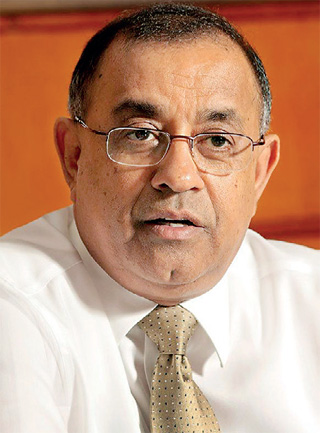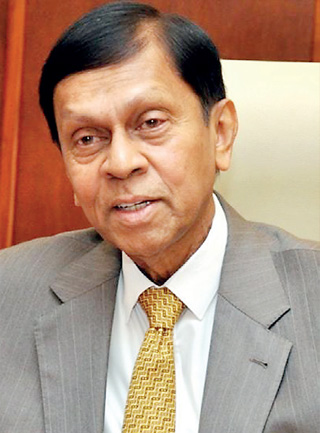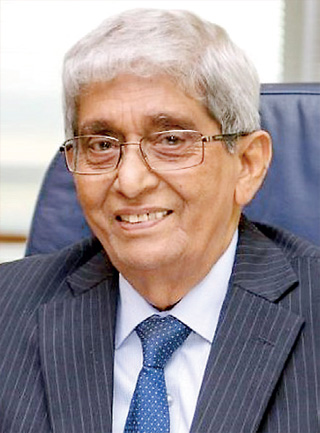Tuesday Feb 17, 2026
Tuesday Feb 17, 2026
Tuesday, 3 August 2021 03:48 - - {{hitsCtrl.values.hits}}

Presidential Secretary Dr. P.B. Jayasundera

State Minister Ajith Nivard Cabraal

Central Bank Governor Prof. W.D. Lakshman
 Sri Lanka is currently facing multiple economic challenges amidst the COVID-19 pandemic. The budget deficit, which exceeded 11% of GDP last year due to tax cuts, has aggravated macroeconomic imbalances. Given the revenue constraints, it has become extremely difficult to meet public debt service commitments which absorb as much as 142% of total Government revenue annually. This necessitates further borrowings to roll over the maturing debt.
Sri Lanka is currently facing multiple economic challenges amidst the COVID-19 pandemic. The budget deficit, which exceeded 11% of GDP last year due to tax cuts, has aggravated macroeconomic imbalances. Given the revenue constraints, it has become extremely difficult to meet public debt service commitments which absorb as much as 142% of total Government revenue annually. This necessitates further borrowings to roll over the maturing debt.
In the absence of adequate foreign loan inflows, the Government is now compelled to resort to domestic borrowings, mainly bank from the banking sector, causing faster growth of money supply by 22% over the last 12 months.
The resulting increased liquidity exerts considerable demand pressures on imports and inflation, weakening the rupee against foreign currencies. The country’s foreign reserves are down to $ 3.5 billion (excluding gold), as against the foreign debt commitments amounting $ 6.8 billion to be met within the next 12 months.
Support from IMF is prudent option
In this difficult situation, the most appropriate policy option available to the authorities would be to launch a cohesive policy framework aimed at reducing macroeconomic imbalances in the short and medium-terms with the assistance from the International Monetary Fund (IMF). Such arrangement would provide sufficient breathing space to implement the adjustment policies that are essential to restore economic stability and to facilitate economic growth.
Although Sri Lanka, as a member country, has the right to seek assistance from the IMF to overcome the economic catastrophe, the Government continues to decline such approach.
Denial of IMF support
Presidential Secretary Dr. P.B. Jayasundera in a recent interview categorically stated that the Government has no immediate plan to seek financing from the IMF. He says that an arrangement with the IMF will not help to boost the country’s exports or tourism. Any borrowing, including IMF programme, is good if there are immediate prospects for economic recovery, he says. But if the borrowing programme is not assuring economic recovery, it is important to work out areas where such assurance will come, he insists.
That assurance will come from investment, not from borrowing, according to Dr. Jayasundera. He further states that a project portfolio around $ 3 billion is available from the World Bank and the Asian Development Bank covering sectors such as water, irrigation, highways, education and health with utilization spanning three to four years. If these projects are fast tracked removing the bottlenecks, the disbursements are a money flow, he said.
State Minister Ajith Nivard Cabraal and Central Bank Governor Prof. W.D. Lakshman too have reiterated in recent forums that the Government has an alternative approach to resolve the current economic problems without resorting to the IMF. However, such alternative approach is yet to be unveiled.
IMF programmes go beyond lending
As pointed out by Dr. Jayasundera, it is true that entering into an agreement with the IMF will not help immediately to raise exports or to attract more tourists. But that should not be a reason for rejecting any agreement with the IMF, since its mission has a broader scope than merely lending to member countries, in contrast to project loans disbursed by the World Bank (WB) or the Asian Development Bank (ADB).
The IMF, which is known as the world’s “financial crisis firefighter,” offers loans or bailouts to member countries that are encountering balance of payments difficulties. As the apex global financial body, it is the mission of the IMF to ensure stability of the international monetary system – the system of exchange rates and international payments that enables countries and their citizens to transact with each other.
Once economic stability is achieved through an IMF reform package, the economy would be conducive to attract foreign investment and thereby to boost exports and economic growth. Also, the country would be an attractive destination for tourists.
IMF conditionalities
The IMF’s lending conditions are designed not only to execute its loan facilities, but also to ensure that the borrowing country will adopt the policy reforms that are needed to restore macroeconomic stability, particularly with regard to the fiscal sector and balance of payments. In practice, the borrowing country has to voluntarily agree to implement the conditionalities without any insistence by the IMF.
Thus, IMF assistance is subject to borrowing country’s obligation to implement certain conditionalities aimed at improving Government finances and external payments. These conditionalities, known as “structural adjustment policies”, include balancing the budget, removing price controls and State subsidies, privatising State-Owned Enterprises, liberalising foreign trade and exchange systems, adopting flexible interest and exchange rates and removing barriers to foreign capital flows.
This is the difference between the IMF and other lending agencies that offer project loans without any conditions aiming at rectifying macroeconomic imbalances such as the budget deficit. Similarly, loans can be obtained from a particular country, say from China, India or Bangladesh, without any structural adjustments. This applies to foreign borrowings raised in global capital markets through International Sovereign Bonds or Sri Lanka Development Bonds which do not carry any reform pledges.
Housekeeping essential
Globally, the IMF is accused of imposing strict conditions on poor borrowing countries. But it may be noted here that such conditions are imposed for the sake of overcoming the macroeconomic imbalances encountered by the borrowing country itself. It is a kind of “housekeeping” that helps a debt-ridden country to escape the debt trap. This is what is needed at the moment in the case of Sri Lanka which is caught in a debt trap.
Given the stringent conditionalities attached to IMF facilities, the Sri Lankan Government has been increasingly resorting to non-conditional loans raised from individual countries and global capital markets. This has led to accumulate the debt stock rapidly over the last 15 years without adhering to any structural adjustments to achieve macroeconomic stability, particularly fiscal discipline aimed at reducing the budget deficit.
Undisclosed alternative approach
In a recent TV interview, Central Bank Governor Prof. Lakshman mentioned that the advice given to the Government by various people in newspapers almost on a daily basis is that obtaining assistance from the IMF is the only solution. But even within Sri Lanka there were times we resolved problems of this nature without IMF interventions, according to him. He further stated that none of the 16 IMF programs implemented in Sri Lanka over the last 40 years or so did not help us to get out of the problems and to attain a sustainable growth.
Prof. Lakshman mentioned that there are alternative ways of resolving the economic setback. But as usual he did not disclose any such alternative path to address the critical problems that the country is facing today – heavy loan commitments, export shortfall, foreign exchange shortage, import restrictions and depleting foreign reserves.
Instead, he said that certain elements contained in the Presidential election manifesto, which was later adopted as the Government’s economic policy, are being implemented at present. They include emphasis on the domestic production economy and exports, restrictions on non-essential imports, reliance on non-debt investment and reduction of foreign debt component.
I wish to emphasise here that the failure of the past IMF programmes in Sri Lanka was largely due to the non-adherence to such policy packages by the successive Governments for political reasons. Most of the structural adjustments contained in those programmes were abandoned halfway, as they contradicted with the populist policies such as consumer subsidies and public sector employment which have been used to win elections by the successive Governments. A good example is the premature suspension of the three-year Extended Fund Facility (2016-2019) programme with the IMF in 2019.
Hence, it is not reasonable to say that the IMF programmes were unsuccessful entirely due to their weaknesses.
Debt rollover
State Minister Cabraal claims that the prompt settlement of $ 1 billion worth of International Soverign Bonds on the due date (27 July) has proved that all the doomsayers and sceptics, both globally and locally, are wrong. He mentioned that multiple measures have been implemented to first stabilise the economy and stimulate thereafter, and to preserve foreign currency reserves.
He states that the Government was negotiating over $ 2 billion in foreign funding in the short term via bilateral and multilateral arrangements. They include currency swaps of $ 400 million with the Reserve Bank of India and $ 200 million with the Central Bank of Bangladesh, $ 200 million from the China Development Bank, $ 780 million via enhanced Special Drawing Rights (SDR) from the IMF, as well as a syndicated loan of $ 700 million.
It should be noted that all those foreign exchange inflows, with the exception of IMF’s SDR allocation, are loans. Raising foreign loans to service the existing debt in such manner without making implementing any policy reforms to ensure fiscal discipline further aggravates the country’s debt vulnerability.
IMF lending to deal with COVID-19
In responding to the urgent financial needs following the COVID-19, the IMF has doubled the amount of funds available through two lending programmes – the Rapid Financing Instrument and the Rapid Credit Facility.
The Fund has lent out to more than 100 member countries under those facilities. Sri Lanka, however, is yet to seek such assistance.
Escaping the debt trap
Formidable policy reforms aiming at fiscal discipline are imperative to relieve Sri Lanka from the debt trap. Continuous borrowing from sources other the IMF has become the preferred choice of the country’s top policymakers to avoid painful structural reforms that may hurt the voter base.
As the saying goes, there is no such thing as a free lunch. So, it is left to the policymakers to decide whether to avoid policy reforms by continuous borrowings or to escape the debt trap by adopting a stabilisation policy framework so as to phase out the borrowing spree.
(The writer is Emeritus Professor of Economics at the Open University of Sri Lanka and a former Director of Statistics, Central Bank of Sri Lanka, reachable at [email protected])